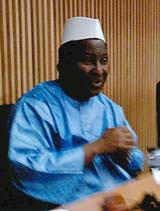African Union encourages new discussions

Alpha Oumar Konare, chairperson of the African Union and former president of Mali, gives a speech to an audience at the Gender Policy Conference on equality during the annual A.U. summit.
On June 28, I was invited by the African Union Senior Social Affairs Officer to attend the A.U. Gender Policy conference.
When I walked into the room, I found it packed with women from all over the world, representing different international organizations. I had a chance to listen to the chairperson of the African Union, who is the former president of Mali, Alpha Oumar Konare, give a speech centered on the promotion of gender equality in Africa. I had not made any arrangements to speak with the chairperson about the conflict; however, his speech made me realize I needed to find a way to talk to him.
One day I decided to take my chances and go to the “cabinet” where Konare works. I found his personal assistant, a man I had been introduced to earlier that week. I told him about how much I wanted to speak with Konare. I understood Konare was a busy man, but I was determined to see him. While I was busy explaining to the personal assistant what I needed, Konare walked out of his office. His personal assistant introduced me to him, and I explained why I wanted to see him. I was so impressed at how accommodating he was when he invited me into his office to talk about the peace process.
He started out by talking about the position of the African Union in this conflict. He said even though most conflicts are complicated, the Ethiopia-Eritrea is especially complicated because the people who are fighting are basically the same people. They had fought together, side by side, to oust Mengistu but were now fighting each other.
“They are brothers and sisters who are fighting, and we all know that family disputes are the hardest to solve,” Konare said. “That is why we as their neighbors should help them.”
He said the conflict between Ethiopia and Eritrea was preoccupying the African Union. Both countries have said continuously they do not want war. However, Konare expressed his belief that if a solution was not found, the risk of war would always be pending. He said due to the nature of the war, it was necessary for the African Union to encourage dialogue between the two countries. Since the border decision was declared in April 2002, it is clear to the African Union that a legal decision that has to be adhered to has been made. On the other hand, Konare said even though legal decisions are made, they are sometimes difficult to abide by – especially if one party believes the decision is not just. He emphasized the fact the border issue was affecting other issues such as economic trade and the movement of the people.
“Even if there is a demarcation of the border, if there is a hindrance of movement in terms of trade as well as people, the border is worthless,” Konare said. “Addis is the capital of Africa because it is the headquarters of the African Union. If the conflict restarts, the A.U. might be a target.”
According to Konare, the two countries are in a strategic location because peace in Ethiopia and Eritrea could mean peace in Somalia, Sudan and Northern Uganda. With peace, Konare believes the Nile River, which flows from Ethiopia to Egypt, can be handled well and provide for other countries. Peace in this region could mean less arms trade from the Indian Ocean into
other parts of Africa, and it could also encourage the fight against terrorism. Peace in the Horn of Africa could mean peace in the Great Lakes of Africa, where millions were slaughtered for the purpose of ethnic cleansing. Peace in the Horn of Africa could benefit the Democratic Republic of Congo, a country that has been in complete anarchy and cacophony due to constant armed conflict.
Konare said peace will be perennial in Africa only when Africans look at the issues they are facing with a democratic vision. He said African conflicts need to be solved with the African Union and New Partnership for Africa’s Development vision. He added the African Union was in search of peace, democracy and development throughout the regions of Africa.
I was curious to know what his thoughts were concerning the West, and the aid it provides to Africa.
“It would be ideal if Africans could rely on themselves,” Konare said.
He said Africa was on the path toward self-reliance. For example, the mission for Ethiopia and Eritrea is the first mission started by the African Union; it is only controlled by the United Nations because the African Union lacks resources.
“The A.U. is helping the U.N. with the Ethiopia-Eritrea Mission so that the U.N. can help Africa,” Konare said.
Your donation will support the student journalists of Missouri Southern State University. Your contribution will allow us to purchase equipment and cover our annual website hosting costs.



























